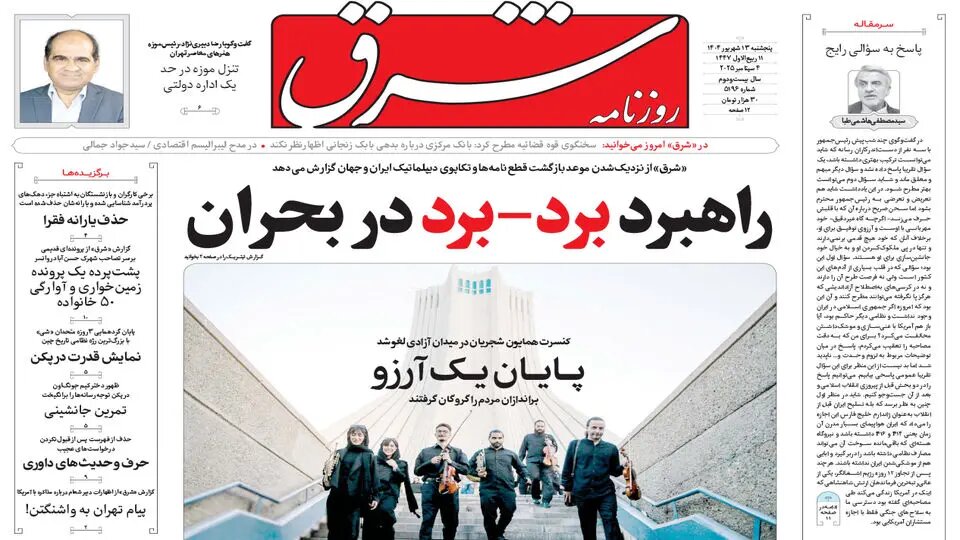Upcoming and future scenarios of negotiations

TEHRAN - Shargh examined the new round of diplomatic moves regarding the Iran nuclear issue as the European trio of Britain, France and Germany have invoked the snapback to return the UN Security Council resolutions against Iran.
It wrote: While the three European countries, along with the United States, are emphasizing maintaining maximum pressure against Tehran, Russia and China are trying to change the power equation by presenting a new resolution. Despite the movements of Russia and China and proposals by Iran, the fate of the new resolution remains unclear. Analysts believe that Russia may simply be seeking to present itself as a mediator and, in the event of a failure of negotiations, blame the United States and Europe. On the other hand, Europe and the United States, by maintaining the pressure policy on Tehran, want to keep Iran in a permanent state of suspension. Tehran considers this approach a political blackmail. Iran believes that it must create an environment in cooperation with its Eastern partners, both legally and economically, in which sanctions will have little practical effect. Ultimately, it seems that the future of the nuclear negotiations and the fate of the snapback mechanism depend on the extent to which the actors are able to create a global consensus and take advantage of diplomatic opportunities; an opportunity that, although limited, still exists.
Etemad: National cohesion is Iran’s most important winning card in negotiations
In an interview with Etemad, Hossein Nourani-Nejad, the deputy chairman of the Union of Islamic Iran People Party, said Iran’s strength in negotiations with the United States lies in its national unity. He said: Given previous experiences, greater caution should be exercised in negotiations with the Americans. However, the issue that constitutes the negotiators’ red line is national interests, preserving the country, and creating security for the Iranians. The lingering shadow of war, accompanied by the heavy burdens of tension and anxiety, must be lifted—not only from the hearts of the people but from the soul of the nation itself. In the current situation in which Iran has gone through a 12-day war, internal cohesion is Iran’s most important winning card. We must support the Iranian negotiators to achieve the best outcome. This card of Iran’s game must be preserved and strengthened. In the past, it was stated that in order to solve economic problems, Iran must resolve problems in the areas of foreign policy. Given the events following the October 7 incidents, Iran must resolve problems in the field of foreign policy in order to resolve economic problems. Today, Iran's most important winning card for solving foreign policy problems is national unity and social cohesion.
Farhikhtegan: Iran keeping the door of diplomacy open
Farhikhtegan wrote that Tehran is seeking to keep the path of dialogue open despite United States’ attack on Iran’s nuclear infrastructure during the negotiations: Iran's emphasis on adherence to diplomacy, even in the midst of a cessation of war, is important from several aspects. Despite its aggression on Iran, the United States is always trying to depict Iran as a threat to the region. Iran's emphasis on seeking to resolve challenges through diplomacy sends a clear message to the world that Iran not only does not want war but also seeks to manage crises through negotiations. Despite responding to aggression, Iran does not welcome war and seeks to use peaceful means to manage tensions to the extent possible. This time, Iran will sit at the negotiating table with a precondition that the Americans provide guarantees (that they will not start war during the talks). This approach shows that Iran is trying to keep the door open to diplomacy and not completely close it. However, it is not going to concede to the wishes of the Americans and give them whatever concessions they want.
Iran: Eastern front against snapback
The Iran newspaper wrote that Iran, Russia and China are forming a front against the return of the UN sanctions the Islamic Republic by the European trio. It said: Only three weeks are left until the end of the critical 30-day deadline for the UN Security Council to vote on activating the snapback sanctions against Iran, but Tehran is seeking to counter Western pressure, relying on the decisive diplomatic support of Russia and China. By forming an Eastern diplomatic front, Iran is trying to neutralize or at least delay this mechanism, along with Russia and China. Iran has focused on bringing together other permanent and non-permanent members of the Security Council, including Algeria and Pakistan, countries that, although they have limited legal power, can politically create a broader front and put significant psychological pressure on Europe and the United States. This targeted diplomacy is rooted in shared geopolitical interests and deep global divisions after the Ukraine war. A division in which Russia and China, as two major powers against Western hegemony, are trying to maintain balance in the international arena by supporting Iran, while keeping the space for negotiations open.
Leave a Comment